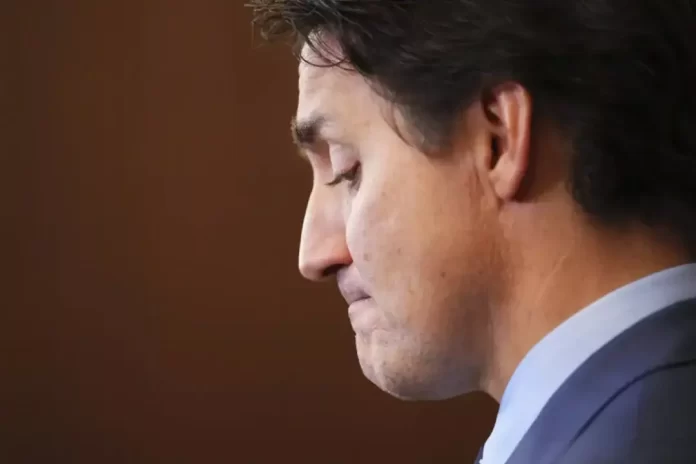The Cascade sat down with UFV students Zack Castiglia, Lauren Onderwater, and Zachary Fletcher, of the Political Science Student Association (PSSA), to chat about the race for a new Liberal Party Leader, Pierre Poilievre’s conservatism, and voter apathy. Want to stay involved? Follow @ufv.pssa on Instagram.
Let’s situate what Trudeau’s resignation means. For the person who replaces him as Liberal Party leader, what does that look like for the next person coming in?
Castiglia: The House of Commons is supposed to fall on a confidence vote. The opposition parties are promising to defeat the government, which would mean an election right after Trudeau’s successor comes into office, so they could theoretically be the shortest serving Prime Minister we’ve ever had — like a few weeks. But there might be a chance that the government doesn’t get defeated, in which case the next election wouldn’t be until October.
What do you think of Mark Carney?
Castiglia: I think that Carney is ideal for this moment, because we’re dealing with intense economic threats right now, and he was Governor of the Bank of Canada, Governor of the Bank of England. He has a lot of private sector experience, so it seems like he’s well suited to handle the economic bombardment that’s coming our way.
Fletcher: Carney is the antithesis of the Liberal government right now. He’s everything that the Conservatives have been pointing to on the issues of the Liberals. Carney comes in like, ‘Hey, I’m the economy guy.’
Onderwater: Any other MP that is tied to Trudeau leadership will automatically have that argument from Poilievre of ‘they’re just like Trudeau.’ Carney is the only front runner that you cannot make that argument against.
What about Chrystia Freeland?
Castiglia: She’s definitely positioning herself like the wartime leader … I don’t know how voters will respond to that. Someone who [Donald] Trump hates might not be good for us. I think most people see Chrystia Freeland as a better minister than she would be a leader.
Fletcher: The biggest obstacle in reality — she was quite literally the right hand man to Trudeau. When Trudeau wasn’t in Parliament, she’s the one who would step forward and be the speaker for the Liberal Party … out of courtesy, she resigned, but it was also a way for her to distance herself from the Trudeau government. She was his Finance Minister and the main problem Canadians are having is with inflation and Canada [being] pretty unaffordable right now.
Who do you think is the best match for Poilievre?
Castiglia: It seems like he’s guaranteed to win regardless, but I think the person who gives him the most worry is probably Mark Carney.
What kind of benefits could we potentially see from having a Conservative government?
Castiglia: It does look like Poilievre is wanting to take a stance against tariffs. Also, Poilievre is friends with the Trump party. One of the Conservative MPs [spoke] at J.D. Vance’s wedding. It could make Trump more willing to help us out if he has somebody in power that is more aligned with him.
Fletcher: If the Conservatives say everything they’ve been saying, then I think we might actually see some economic benefits. I mean, [Poilievre] said he would get rid of the carbon tax. That was a big one, but all the other liberals have said they’ll do the same … But good or bad is in the eyes of the beholder.
Onderwater: The only two benefits I could see are regarding defence. Maybe we could hit our two per cent GDP. He might take defence more seriously. Also, the Liberals have brought in a lot of private firms to do civil service jobs and are overpaying those people. Maybe he would trim down the fat of the bureaucracy.
What do you make of Poilievre’s comment that he is “only aware of two” genders, but that the government should “just mind its own damn business,” considering the policies that were introduced in Alberta by Conservative leader Danielle Smith?
Onderwater: We saw something really similar with [Stephen] Harper. When Harper was running, abortion was more of a topical issue in Canada for lots of Conservatives, which is still true today. Harper’s stance was, ‘I’m against abortion, but you’re not allowed to bring this up as an MP in my party,’ and I would say Poilievre’s comment is reflective of that. He’s appealing to his conservative voter base that is more socially conservative, but he does not want to alienate the more socially liberal. It’s very Canadian, very Canadian Conservative.
Anything for those struggling with voter apathy?
Fletcher: I say, if you don’t want to vote, go to a voting booth and spoil your ballot. Tell the government you don’t like your candidates. There’s literally an option saying, I hate everyone on this ballot. Spoil your ballot.
Edited for length and readability.
Kiara Okonkwo is a writer and creative. She received a diploma in Screenwriting from Vancouver Film School and is pursuing her Bachelor of Fine Arts in Creative Writing and Media and Communication Studies. Kiara values self-expression and authenticity.


